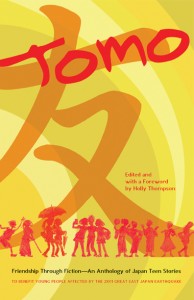JQ Magazine: Book Review – ‘Tomo: Friendship through Fiction: An Anthology of Japan Teen Stories’

“Reading ‘Tomo’ is a reminder that even in the most desperate straits, friendship and personal relationships have the power to nourish and sustain us.” (Stone Bridge Press)
By Sharona Moskowitz (Fukuoka-ken, 2000-01) for JQ magazine. Sharona is interested in fresh, new voices in fiction and creative nonfiction.
If you could know your future cause of death, would you choose to know? This is the question posed by “Yamada-san’s Toaster,” one of the short stories in the new fiction anthology Tomo: Friendship through Fiction: An Anthology of Japan Teen Stories. As the title suggests, the collection is geared toward adolescents and dedicated to the youth of Tohoku, though it undoubtedly has— in the parlance of publishing— tremendous crossover appeal. There is plenty for adults to enjoy here, too. Edited and with a foreword by Holly Thompson, this collection features 36 stories—including 10 in translation—contributed by several JET alums from around the world, all of whom share a connection to Japan. Proceeds from its sale will go directly to the continued relief efforts.
In Kelly Luce (Kawasaki/Tokushima, 2002-04)’s story, Yamada-san’s toaster burns into each slice of bread a Chinese character supposedly predicting one’s cause of death. The tale’s young narrator observes the effects of the toaster on the townspeople as news spreads and they become stirred into a ridiculous pandemonium. There’s a great element of humor to the story though it also reveals a universal human folly: the vulnerability towards superstition. People try desperately to find order and make sense of a chaotic and random world, even if it means looking for burnt kanji of the toast on a breakfast plate.
The stories are grouped thematically, represented by “Shocks and Tremors,” Friends and Enemies,” “Ghosts and Spirits,” Powers and Feats,” Talents and Curses,” Insiders and Outsiders” and “Families and Connections.” (The final story, the poignant “Peace on Earth,” is penned by Suzanne Kamata (Tokushima-ken, 1988-90), whose own book of short stories, The Beautiful One Has Come, was released last year.
For many of the characters in Tomo, the earthquake and tsunami are catalysts for inward reflection and personal evaluation. Thoughts and emotions gush out like the waves themselves. The surreality of the disaster and its aftermath force the teens to become conscious of mortality and reexamine their own ideas about the impermanence of the material world, all the while grappling with some of the thornier trademarks of adolescence such as self-esteem, alienation, tests of friendship and a frustrating desire to understand that which simply can’t be explained. Yet despite these weighty issues, the tone of the book never feels gloomy, nor its characters overwrought. Tomo treats young adults with the intelligent dignity they deserve.
“With time, we’ll all find our harmony again,” concludes the narrator of the short story “Half Life” by Deni Y. Béchard. And one year after the earthquake, this seems to be the case. Reading Tomo is a reminder that even in the most desperate straits, friendship and personal relationships have the power to nourish and sustain us. While the future is uncertain and death is indeed imminent, the sturdy bond of friendship may in fact be the more important great equalizer.
A special book launch event with Holly Thompson and Tak Toyoshima will be held at the Boston Children’s Museum on Friday, March 23 at 6:30 p.m. Admission is one dollar, online RSVP requested. For more information, visit www.japansocietyboston.org/tomo. For more on Tomo, visit http://tomoanthology.blogspot.com.


Comments are closed.